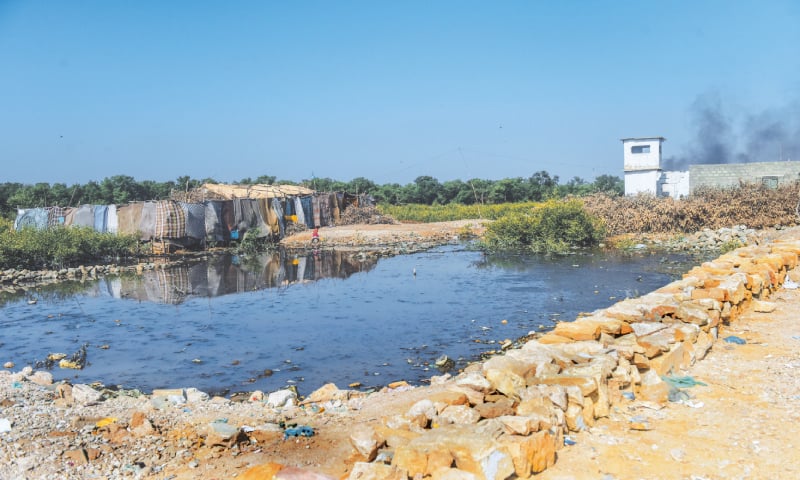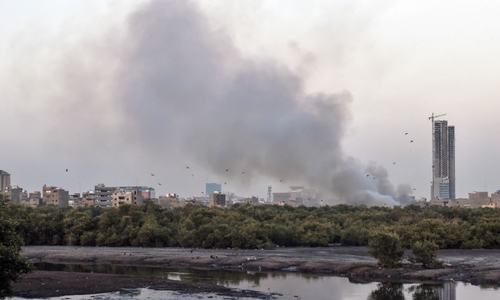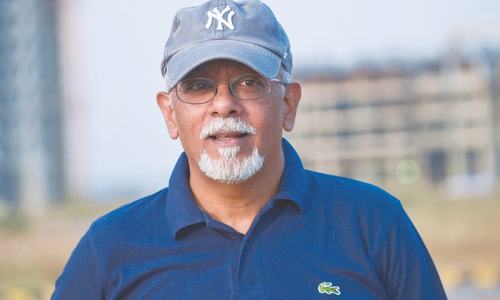KARACHI: The big, small, tall and short, leaning, titling, pink, yellow, orange, blue and plain brick dwellings scattered along Mauripur Road are covering up a secret. There is a mangrove forest right behind them that is not going to be there for long.
The mangrove cover along Pakistan’s coastline supports various life forms. It is an entire ecosystem. The trees serve as protective shield against storms, cyclones and tsunamis. Their roots are also home to different kinds of marine life, including fish, shrimp and crabs. Birds such as pelicans, flamingos, kingfishers, cranes and ducks come here to feed.
Braving the muddy slush in the long narrow winding bumpy lanes of Machhar Colony, not to mention the sometimes chemical, sometimes gutter and sometimes rotten stench, you reach the mangrove forest.
There are children running around, playing among the heaps of dirt there. Someone has piled up rocks in a neat line on one side. The same rocks have also been used to build pathways in the stagnant black water. The children walk on them to reach the two or three huts built over the wet area.
A woman peers through the tattered cloth hung out as a curtain to cover the rickety entrance to her home. A man with grey hair and beard comes out. He sees your car and frowns. He takes out his phone to inform someone at the other end about your presence. He comes over to inquire about your business there.
Timber mafia, landgrabbers at work along Karachi’s coastline
You glance at the playing children and lie. You are there to survey schools and see how they are coping with in the latest wave of the pandemic.
He directs you to the TCF School and another smaller school falling before it. Meanwhile, your photographer is snapping pictures. One of the children tells him that he is looking in the wrong direction as further ahead there are the Pakhtun men with their machines.
What machines? “The machines to clean the mess of trees and clear the way for people to build their homes,” the child tells you. As is the practice, you understand well that they are cutting down the trees from the dense area inside while keeping the trees in the front intact. What they cut they move out fast.
But there is so much water beneath the trees. How can anyone build there? “Oh that’s no issue. They fill up the area with rocks and mud to build over it,” another young boy informs.
Meanwhile, the bearded man is becoming agitated. He tells one of the older children to get in your car with you to help you find whatever school you wanted to go to. We thank him for his help and reassure him that his directions were good enough to help us be on our way. He goes back inside his home. We drive off but can spot him behind, following us with his eyes, with his phone to his ear.
Carving out of plots
The mangroves though in patches now, wherever they clash with population, are connected to more mangroves lining the Arabian Sea near the Sandspit Beach.
The destruction and intent of people there is more evident. At the Kakapir village in Younisabad, they have been cutting the trees to make way for construction. Plots of about 80 yards to 100 yards have been created and houses are coming up.
This is the same village where two environmental activists, Haji Abu Bakar and Abdul Ghani, were killed and drowned allegedly at the hands of the land mafia in 2011.
Both the men had started an awareness campaign against the illegal cutting down of mangrove trees by land grabbers, before they met their unfortunate fate.
Mangrove as burning fuel
Secretary-general of the Pakistan Fisherfolk Forum (PFF) Saeed Baloch tells Dawn that at Machhar Colony the mangrove cover is under attack for timber.
“The wood from the mangrove trees is sold to factories that use it as fuel for their boilers as this wood is far cheaper than furnace oil,” he says.
“Not just in Machhar Colony, this is also going on in Ibrahim Hyderi and Rehri Goth,” he adds.
About cutting mangroves by the land mafia for construction at Kakapir villages, he says that it has also been going on since long.
“We hear of ‘China cutting’ going on in the city. Out here it is ‘mangrove cutting’ to make way for construction. The PFF started its fight against the land mafia, who were chopping down mangrove forests, from Kakapir village only. And we paid for it dearly by losing two of our colleagues.
“It has been so many years now but nothing could be done about it. We approached the forest department, we approached the Karachi Port Trust (KPT) since these areas come under its territory, but nothing other than their people coming here rarely and getting their pictures taken and seem concerned,” he says.
Machhar Colony total encroachment
Dawn got in touch, regarding this matter, with the Federal Minister for Maritime Affairs Syed Ali Haider Zaidi.
“There are no mangroves being cut in KPT territory. There is a wood cutting mafia active in Bundle Island and its vicinity. We have deployed extra port security officers on and around the island,” he explains.
About the mangrove destruction at Machhar Colony, the minister for maritime affairs adds: “The whole Machhar Colony has been encroached for three decades.”
Published in Dawn, January 21st, 2022













































